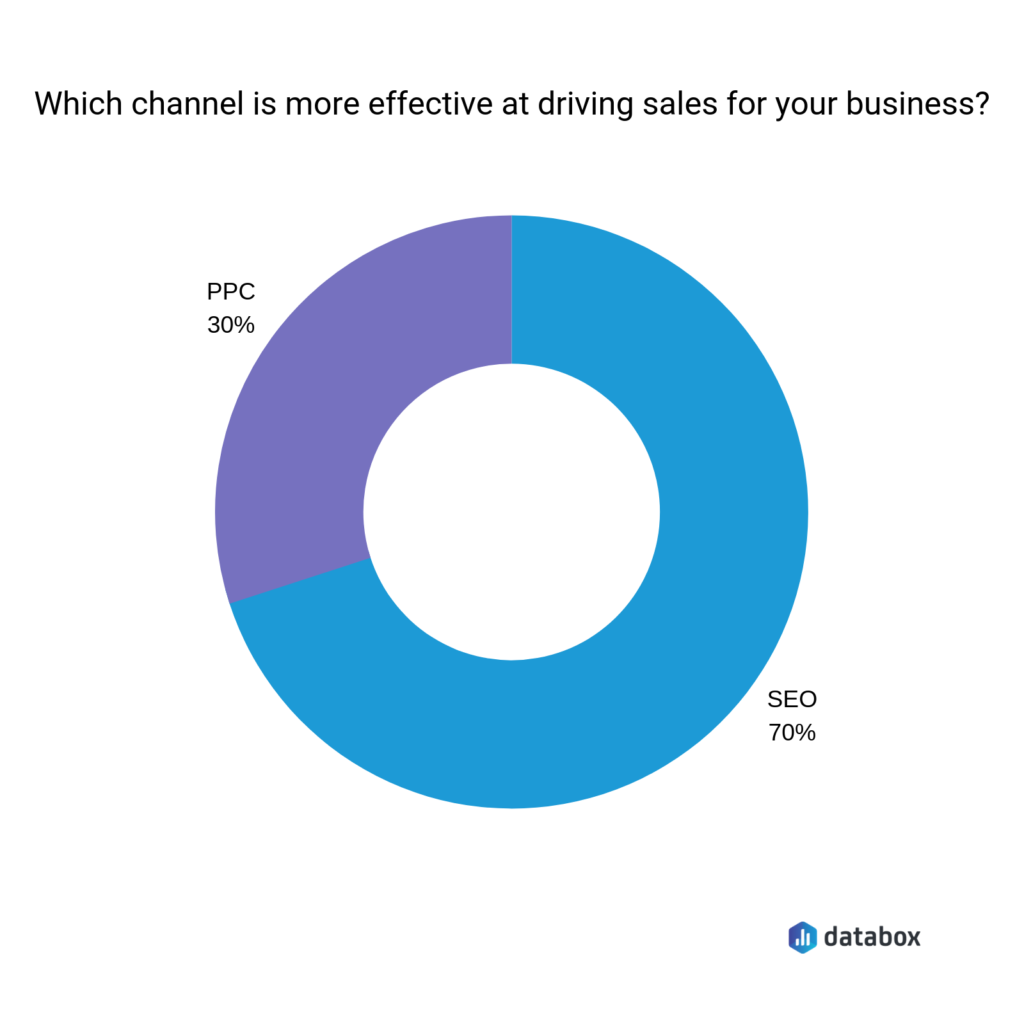
Organic content is an opportunity to speak directly to your audience. Whether they’re looking for information, education, humor, or entertainment, deliver it through the content on your website.
This organic content may reach your target audience through being shared peer-to-peer or getting picked up by a news outlet or influencer in an industry. Having organic content on your website can also impact where your webpage lands in search engine results. In turn, this can affect the number of customers and leads a business generates through digital marketing. These elements form organic content marketing.
What is Organic Content Marketing?
Organic content allows your audience to find you through organically surfing the internet. It provides the necessary material that your audience or potential clients may be searching for. Whenever you scroll through social media and click and a link with an interesting headline or conduct a Google search and click on a useful-looking link, that’s organic content marketing.
In practice, organic website content consists of the blog posts, social media posts, videos, downloadables, etc. that you post online for a willing audience to consume.
This content relates directly to the topics of your website pages. It’s helpful that your organic content is relevant because your website’s users are likely on your website because they are interested in a specific topic or solving a particular problem. For instance, if you have a company that offers an inventory tracking app for small business owners, you may write content about:
- How to use your app
- Some of your app’s lesser-known features
- Best shelving units for inventory storage
- Labeling systems to make inventory easy for your staff to locate
- And so on
When the content is relevant, useful, and engaging, prospective customers can find it by typing related keywords into search engines. It’s beneficial because the main goal of search engines is to find the most relevant and useful content for the searcher.
Make sure your content is engaging, readable, informative, and contains keywords pertaining to the searched topic. This will influence how your website ranks on search engine results pages.
 Organic Content and Paid Ads
Organic Content and Paid Ads
Some people think organic and paid content is a binary choice. That it’s one or the other, but to work effectively, both should be employed. Organic content tends to make a bigger impact on the audience it reaches because the viewer either found it themselves or through a trusted source.
53% of website traffic comes from organic search.
However, reaching a large audience that way can take a long time and there’s no surefire way to know that your content is being shared among your target audience. Paid digital advertisements, like Facebook ads and Google ads, display where the target audience is likely to be. This means that you can be sure your ad content is reaching the desired audience. Additionally, paid ads help your business get in front of your audience quickly. For a brand new business without much organic content or an already established following, paying to reach the desired audience can help the company grow at a faster pace. However, these days online users are accustomed to seeing many ads and may choose to ignore them.
Organic Content and SEO
SEO (Search Engine Optimization) and organic website content go together like peanut butter and jelly.
Quality SEO and content can help your business rise through the ranks in search results pages. Simply put, more relevant and updated content on your site means more pages may be indexed by a search engine and put into the running for rank. This also gives you a chance to have a better ranking for various keywords.
Using relevant keywords and publishing unique content will help search engine users find your website. This will give you the opportunity to grab their attention. Adding pictures, graphics, and links to your webpage copy creates more visually appealing content and compels users to interact with your website.
Engaging with your audience is great and everything, but how does that translate to revenue?
Databox conducted a survey of marketers and found that 70% said that SEO was more effective than pay-per-click ads for generating sales. Keep in mind that SEO is a long-term strategy and won’t increase your sales overnight.

Defining Your Content Strategy
Clearly defining your organic website content strategy helps you narrow down your audience, content, and platform as a whole. Keep in mind why an audience or clients may come looking for your services. To build out your organic content marketing strategy, ask yourself questions like:
- What challenges do my customers have?
- What’s a creative way to use my product most customers don’t know about?
- What do my customers love about my product?
- Why do some people choose competitors over me?
- Is my product or company relevant to other things in my customers’ lives or recent news?
- What information is my audience looking for when evaluating a product?
- What is the biggest pain point when purchasing or using my product? Or perhaps, what pain point can customers avoid by choosing your product over the competition?
Answering these questions will give you ideas of what your audience might find interesting to read or learn about. Choose blog topics that answer some of these burning questions and plan out a schedule to write and post them. The next steps are writing the content, editing it, and posting it with a catchy, compelling headline that will capture people’s interest.
Content and Context
When writing your blog content, keep in mind that the voice and tone of your business can help add a connection to your content for the reader. The tone can be anything you want, just make sure it fits your business and connects with your audience. Not sure what tone of voice will connect with your audience? Try out a few different ways of speaking or writing and see what gets the most engagement.
You should see your website as an important part of your marketing strategy and ensure that it’s supplying the audience with quality, meaningful content.
Did Your Organic Content Marketing Strategy Fail?
Sorry to say, but if your content strategy failed, it’s probably because:
- Your content sucked
- Your content was too self-promoting
It’s tempting to make every blog post simply a braggadocious rant of why your product is the best, but users don’t want to read that. Inevitably, being overly self-promoting will drive your audience away. And if your content was simply not stellar, try a different approach. Add some graphics, use some interesting stats, and read other popular blogs and identify what makes them interesting (better yet, hire a marketing agency – we’re professionals).
Differentiating Your Brand Online
To differentiate your brand from competitors, you need to have a deep understanding of your company’s goals, tone of voice, and audience. Having a unique positioning and voice will clearly communicate to your audience who you are, what you do, and why to choose you over your competitors.
For example, if your company is the best at something in your industry, focus on that expertise. In addition, if there are some niche services you offer, that is a great way to set yourself apart! Communicate that expertise and those services through your website content.
Think about a well-known brand such as Apple. Their brand is known for its sleek products and incredible design. You’d expect its website to be the same, right? Exactly. It communicates to the audience who they are and what they’re about.
Writing a Blog
Having a blog on your website is incredibly beneficial for adding organic content. It allows you to be helpful and useful to your audience and also boosts your SEO. Blogging on topics that pertain to your industry will build an audience that trusts you in that area. If you continue to publish content consistently that is also effective and engaging, then you can establish your business as a source of information that users will return to in the future.
Blogging is great for small businesses. Posting blog content gives you another opportunity to engage with your audience outside of serving them. Many small businesses are owner-operated, meaning that the customers engage directly with the business owner when they purchase. They get to know you and your business face-to-face. However, when the transaction is over, that engagement ceases. Therefore, blogging provides an avenue for you to continue to provide value and display your passion to your customer base.
Bonus: Search engines love to see new content on websites on a regular basis. Your website is not a ‘set it and forget it’ situation. Think of it as a living, breathing thing that grows and changes along with trends.
Do you always have to write new organic website content? No, actually. Hubspot found that many of their leads were coming in from just a few older blog posts. They knew these posts were great and wanted to beef up some of the other blogs they had put so much hard work into. They started an initiative they call “historical optimization,” which essentially means updating and optimizing your old blog content. If your website is connected to an analytics tool like Google Search Console, you can see how some of your pages are performing in search engine results. Also, if you notice a few that had a big impact, then declined over time, revisit them and optimize them where you can.
(If you’re wondering about this article, the answer is ‘yes,’ I’m revisiting and optimizing it right now!)
Conclusion
In conclusion, if all of this sounds complicated or scary, you’re not alone, and it’s for good reason. It takes years of training and practice to learn how to navigate the SEO and website content world. Not to mention the constant updates to algorithms and rules of the digital marketing game. It’s a lot to keep up with. And if you’re already busy keeping your business running smoothly, who has time for all that? Fortunately, that’s exactly why content marketing agencies exist! So that you as a business owner can focus on providing value to your company and customers, and content marketing experts can handle filling your website with engaging, compelling content.
Are you worried that your messaging and organic website content isn’t attracting the right audience? Don’t fret, that’s what we’re here for. Hot Dog Marketing has all the expertise you need to get your digital marketing done right!

Hot Dog Marketing helps expert service providers and tech companies build their brands at the same rate they’re growing their businesses. We have deep expertise in branding and online marketing for both business-to-business service companies and local consumer service businesses.